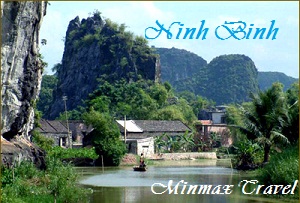- Vietnam Overview
- Main Cities in Vietnam
- Regions in Vietnam
- Other Cities in Vietnam
- Getting to Vietnam
- Getting Around Vietnam
- Language in Vietnam
- Education in Vietnam
- Vietnam Activities
- Vietnam Attractions
- Vietnam Money & Shopping
- Eating and Drinking in Vietnam
- Dress Code in Vietnam
- Gift Giving in Vietnam
- Public Behavior in Vietnam
- Art Performance
- Custom and Habits
Ninh Binh Province
Situated on the Red River Delta, Ninh Binh separates the North and the Central Vietnam by Tam Diep Mountain Range. It is surrounded by Hoa Binh, Ha Nam provinces on the north, Nam Dinh Province on the east and Thanh Hoa on the west and the south.
 Ninh Binh's topography is divided clearly into 3 parts: the mountainous area in the west and northwest; the delta and coastal area in the east and south. Ninh Binh has Day, Van Sang rivers, and Non Nuoc, Canh Dieu mountains. Annual average temperature is 23.4ºC.
Ninh Binh's topography is divided clearly into 3 parts: the mountainous area in the west and northwest; the delta and coastal area in the east and south. Ninh Binh has Day, Van Sang rivers, and Non Nuoc, Canh Dieu mountains. Annual average temperature is 23.4ºC.
Tourism
In Ninh Binh, Hoa Lu Ancient Capital (in Truong Yen Commune, Hoa Lu District now) was chosen as the first capital of Vietnam feudal centralism regime and the Dai Co Viet's political, economic and cultural centre with the name of Kings Dinh Tien Hoang, Le Dai Hanh and Ly Thai To in 10th century. In 1010, King Ly Thai To moved the capital from Hoa Lu to Thang Long (Hanoi now), opening a new era for Vietnamese people.
Ninh Binh owns beautiful Tam Coc, Bich Dong, Dich Long, Hoa Son, Tien caves, Van Trinh Grotto and other special landscapes following:
Cuc Phuong National Park is home of varies of strange flora and fauna. Especially it is enjoyable to touch the thousand-year-old cho xanh (parashrea stellata) and sau (Dracontomelum Duperranum or Dancorra Edulis) trees, 50-70m high. The park is also suitable to watch birds, butterflies and orchid flowers.
Phat Diem Cathedral is a solemn and interesting architectural complex, reflecting the skilful and excellent stone carving art of the Vietnamese workers.
Ninh Binh's people have created such famous and traditional products as Kim Son's fine arts, Hoa Lu's high-class embroidery, hanger products and rocky sculpture products for export, Gia Vien's rattan and bamboo knitting products, etc.
Ninh Binh Travel Guide

